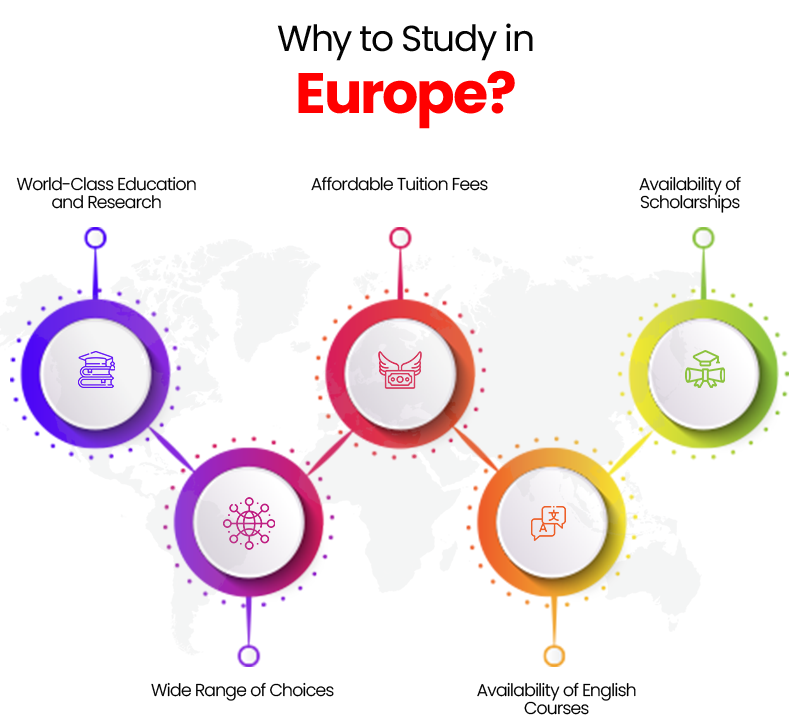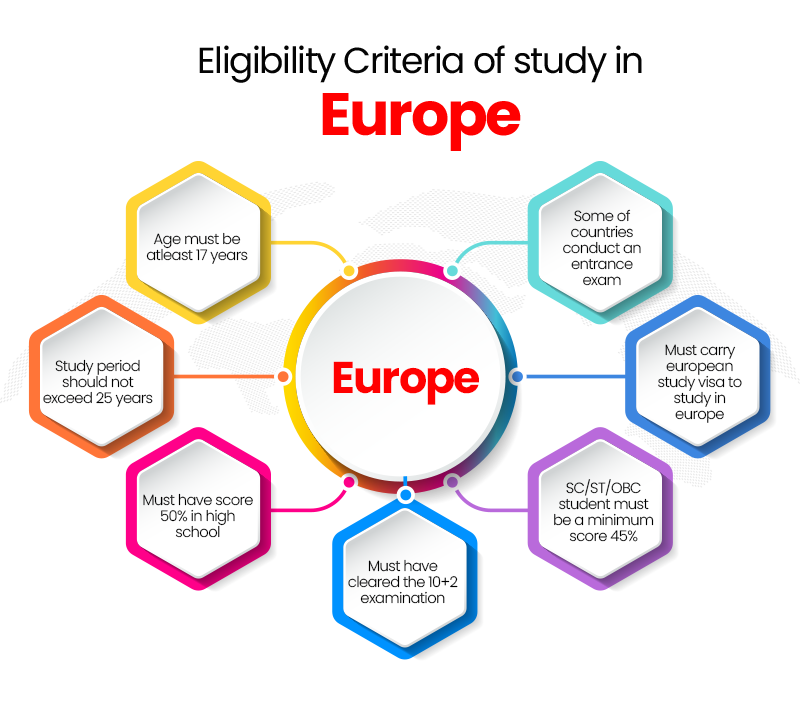Europe has become one of the
top choices among Indian students for studying abroad. The availability of programs in the English language and higher educational institutions made Europe the most sought-after destination.
Europe has seen a remarkable growth of around 48.8% in the number of international students who are seeking admission to universities to study in Europe in its different countries.
The country holds the significance of history and culture with bounds in technology and research. The tuition and living costs in Europe are comparatively low compared to other countries.
There are various reasons why international students choose to study in Europe. Here are some of the major reasons:
-
World-Class Education and Research: Europe is a hub of the world’s best universities. The country offers many opportunities for research and has built a strong educational environment.
-
Wide Range of Choices: There are many available programs to study in Europe, as well as many educational institutions and colleges. The European degree is well-recognized all over the world and is valued by employers.
-
Affordable Tuition Fees: Europe offers many private and public universities with affordable and budget-friendly tuition fees. International students can study many programs, such as bachelor's or master's degrees, and get a high-quality education.
-
Availability of English Courses: If an international student is not familiar with the local language of Europe. They can study various courses in English. The country provides the opportunity for international students to study in Europe in the English language.
-
Availability of Scholarships: International students have the opportunity and benefits of studying in Europe and getting a free education. Many scholarships are available for international students to support themselves financially during their studies.

Top Countries to Study in Europe:
There are many European countries where international students can study affordably and get a better quality of education.
Some European countries, like Germany, the Netherlands, Sweden, and France, offer a wide range of opportunities, including affordable and reduced-cost education, post-study work visa choices, and, most importantly, an immigration-friendly environment.
Here are some of the best countries to study in Europe:
-
Italy: The country is known for its oldest universities in Europe. Italy offers an affordable studying environment that attracts thousands of international students.
-
If you want to study for your master’s in Europe, you can study in Italy for free but with scholarships.
-
Spain: The country is known for its affordability, education, and welcoming culture. It also offers the opportunity to learn Spanish and study the English language for free.
-
Germany: The country is famous for its quality education and opportunities for research, and it is the top choice for international students to study.
-
Among European countries, Germany is witnessing the highest increase in demand for international students at 32.6% due to its low tuition fees, followed by Ireland at 3.9% and France at 3.3%.
-
Lithuania: The country is famous for its rich culture, affordable education, and friendly living costs. Universities and institutions in Lithuania offer theoretical and practical approaches to education, which help students gain personal and professional growth along with practical work.
-
France: The country is known as the home of the best and top-ranked universities in Europe. It is the most sought-after study destination for international students interested in French culture.
-
International students can study for free in the universities with the help of scholarships.
-
Hungary: It is one of the most beautiful and affordable countries. It provides a wide range of study options and a low cost of living.
-
Portugal: Universities in Portugal offer research traditions in higher education. It is the most favorable study destination for students.
Top Courses:
Europe offers many opportunities for international students. The country also provides many courses to study in English. Some of the top courses to study in Europe in English are:
Bachelor Courses in English:
-
Bachelor in Computer Science
-
Bachelor in Economics
-
Bachelor in Business Administration
-
Bachelor in Finance
-
Bachelor in Psychology
-
Bachelor in Liberal Arts
-
Bachelor in Area and Cultural Studies
-
Bachelor in International Relations
-
Bachelor in Education
Masters Programs in English:
-
MA in English Language
-
Masters of Arts in English and American Studies
-
Master's degree in Literature
-
Master in English Studies
-
Master’s degree in Specialized Translation
-
MSc in TESOL with specialism in English
-
Masters Studies in Languages and Literature
-
MA in English Language and Literature
-
MA in English Language and Teaching
-
Masters in Applied Linguistics
Programs to Study for Undergraduates and Graduates in English:
-
International Business
-
Medicine
-
Engineering
-
Physiotherapy
-
Architecture
-
Psychology
-
Information Technology
-
Dentistry
There are many courses also available for students to study after high school so that they can immigrate to Europe and continue their studies. Some of the top courses for students to pursue a bachelor's degree are:
-
Engineering courses
-
Computer Science courses
-
Designing courses
-
Business Administration courses
-
Engineering Management courses
-
Accounting and Finance courses
However, it is necessary to check the eligibility criteria in universities as they may differ in each university in Europe.
The popular courses to study in Europe are management, computer science, IT, engineering, and medical science.
Apart from these major courses, the countries in Europe also offer short-term courses such as:
Top Universities:
Europe has around 5,000 universities across its 44 countries and is known for its affordability, quality of education, and wide prospects of employment and residency.
Here are the top universities in Europe:
-
University of Cambridge
-
University of Oxford
-
Imperial College London
-
University College London (UCL)
-
Swiss Federal Institute of Technology (ETH Zurich)
-
The University of Edinburgh
-
Ecole Polytechnic Federale de Lausanne (EPFL)
-
University of PSL
-
The University of Manchester
-
King’s College London
Eligibility Criteria of study in Europe

International students are required to meet the following eligibility criteria set by the universities in Europe:
-
The age of the students must be a minimum of 17 years
-
The study period should not exceed 25 years
-
Students must have a score of a minimum of 50% in high school
-
Must have cleared the 10+2 examination
-
Students who belong to the SC/ST/OBC category must have required
-
to score a minimum of 45%
-
Students must carry a European study visa to study in Europe
-
Some of the European countries conduct an entrance exam in specific courses. Therefore, it is necessary to be prepared for the exam if you have one in your chosen course
Cost of Study in Europe:
The cost of studying in Europe completely depends on the country, university, and the courses you choose. Here is the list of the average cost of studying in European countries:
|
Countries
|
Average Cost (per year)
|
|
Austria
|
1,500 EUR
1,27,000 INR (approx)
|
|
Denmark
|
45,000 to 1,20,000 DEK
5,05,000 to 13,48,000 INR (approx)
|
|
Finland
|
5,000 to 20,000 EUR
4,20,000 to 16,79,000 INR (approx)
|
|
France
|
2,800 to 3,800 EUR
2,35,000 to 3,19,00 INR (approx)
|
|
Germany
|
100-350 EUR (administration fee)
8,400 to 29,400 INR (approx)
|
|
Hungary
|
1,500 EUR
1,26,000 INR (approx)
|
|
Norway
|
95,000 to 125,000 NOK
7,40,815 to 9,74,757 INR (approx)
|
|
Poland
|
1,500 EUR
1,26,000 INR (approx)
|
|
Sweden
|
80,000 to 2,00,000 SEK
6,24,000 to 15,59,000 INR (approx)
|
|
Slovenia
|
5,000 EUR
4,20,000 INR (approx)
|
Requirements to Study in Europe:
There are certain requirements that an international student must fulfill in order to take admission and study in Europe. Here is the list of certain requirements:
-
When applying for admission to a university in Europe, it is essential to provide specific documents that can support the admission process.
-
If an international student chooses a university that teaches in English, they are required to submit test scores on English language tests like IELTS or TOEFL.
-
However, the requirements may differ from country to country and universities in Europe.
Work Opportunities:
Many countries in Europe offer work opportunities to international students along with their studies to earn money so that they can tackle their day-to-day and education-related expenses.
However, it is essential to check the policies of universities before applying, as some countries allow students to work part-time in their related fields, while some do not.
Europe provides a post-study work visa for students who want to stay back after completing their studies and start their career in Europe.
There are many job opportunities for students in different sectors:
-
Science
-
Engineering
-
Information Technology
-
Finance
-
Healthcare
-
Teaching and Education
Top Scholarships in Europe:
There are many scholarships available to help international students to fund their education in Europe. The government also offers scholarships to international students as well as colleges and universities.
Scholarships offered by the Government across Europe:
-
British Chevening Scholarships in the UK
-
DAAD Scholarships with Relevance to Developing Countries in Germany
-
Holland Scholarships
-
Swedish Institute Study Scholarships in Sweden
-
VLIR-UOS Scholarships Award in Belgium
-
Eiffel Excellence Scholarships Program in France
-
Swiss Government Excellence Scholarships for Foreign Students in Switzerland
-
Danish Government Scholarships for Non-EU/EEA Students in Denmark
-
Italian Government Bursaries for Foreign Students in Italy
Scholarships offered by the Universities or Colleges across Europe:
-
Sheffield Hallam University Transform Together Scholarships in the UK
-
University of Maastricht High Potential Scholarships in the Netherlands
-
Bologna University Study Grants for International Students in Italy
-
Radboud University Scholarship Program in the Netherlands
-
Emile Boutmy Scholarship in France
-
Rennes School of Business in France
-
Amsterdam Excellence Scholarships in the Netherlands
-
Utrecht University Excellence Scholarships in the Netherlands
-
Eric Bleumink Scholarships at the University of Groningen in the Netherlands
-
ETH Excellence Scholarship in Switzerland
-
University of Lausanne Master’s Grant for Foreign Students in Switzerland
-
Lund University Global Scholarships for Non-EU/EEA Students in Sweden
To study in Europe, students must provide proof of their language proficiency in English through various tests like IELTS and TOEFL. Students must be capable of understanding the English language.
Key points you need to know before applying to Study in Europe:
-
It is essential to check the university intakes, eligibility requirements, and application deadlines.
-
IELTS scores are the most preferred scores in universities, and some of the universities may accept TOEFL scores.
-
Determine the cost of studying in Europe, as it may differ from country and region in Europe.
-
Course fees and living expenses in Europe are reasonably affordable, and they may change through regions.
-
Intakes in universities may differ from country to country in Europe. However, the main intakes are in September or October.
By studying in Europe, students can experience ample opportunities and international socio-cultural exposure. They also get the chance to enhance their personality and personal growth.



